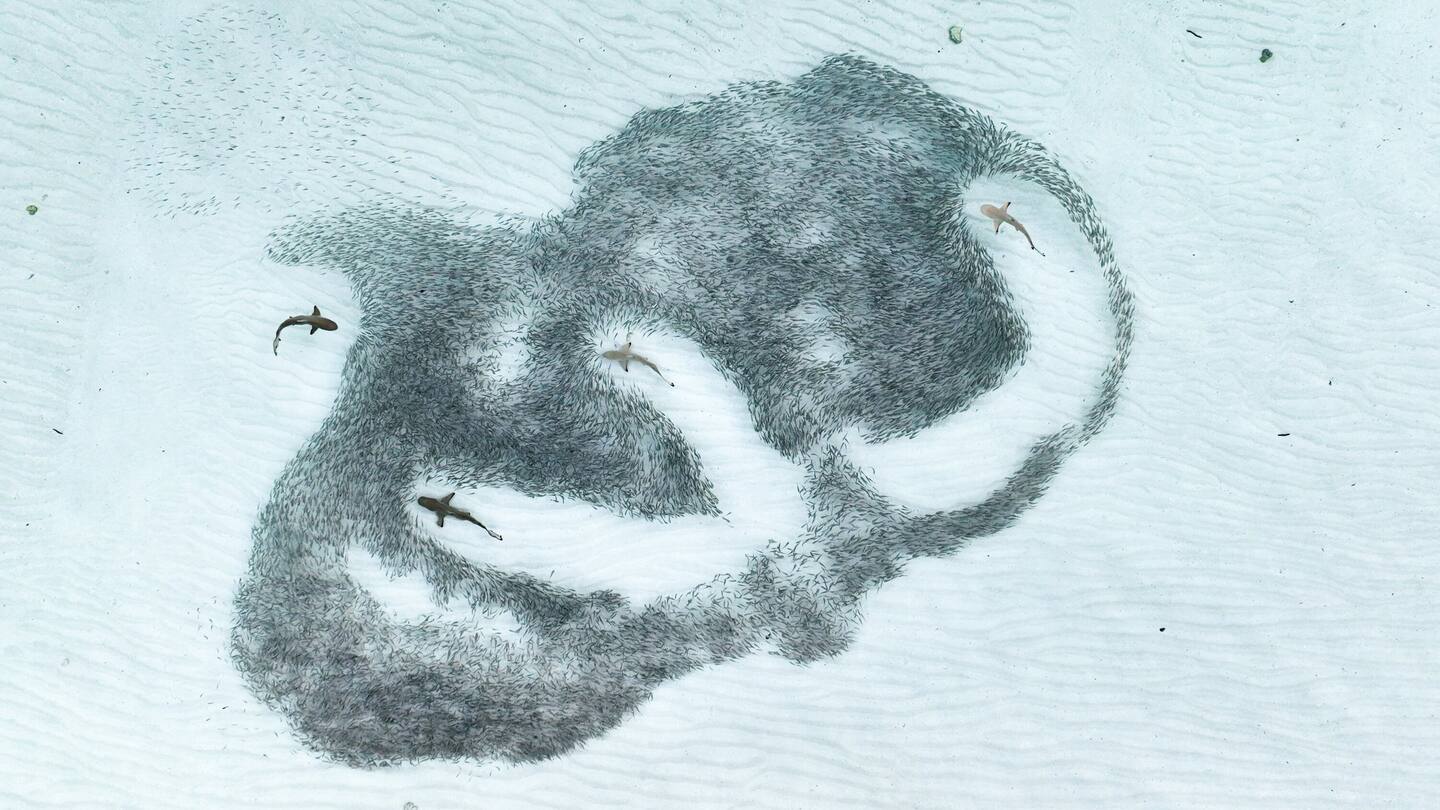SHARK HERDING
By Alex Robertson
NZ Herald·
11 Dec, 2024

The hunt from above - juvenile blacktip reef shark's schooling fish in the Maldives is the winning image in the 2024 Royal Society Publishing Photography Competition. Photo / Angela Albi
An aerial view of sharks rounding up their prey has won the overall prize in the Royal Society Publishing Photography Competition 2024, announced this week.
The winning image, dubbed “the hunt from above” is the work of postdoctoral researcher Dr Angela Albi studying predator-prey interactions of sharks and fish at the Max Planck Institute of Animal Behaviour.
“Just after sunrise or before sundown, the shallow waters of the Maldives become a clear, see-through surface,” she said. “These are also the moments when we best observe the interactions between reef sharks and their prey. In this frame, captured during a research trip in 2024, a shark on the far-left shifts suddenly from swimming calmly within the school to initiating a hunt, its body posture standing out from the others. While we still don’t know what triggers these attacks, we analyse videos to study how sharks hunt and how their prey responds collectively.”
Hugh Turvey, competition judge and Science Committee Chairman at the Royal Society said the bird’s-eye view of the scene helps the raw instincts of nature come to life.
“As the school of fish move in almost perfect synchrony then split to avoid the sharks, the contrast between the collective movements of the fish and the sharks’ calculated group pursuit perfectly demonstrates the delicate balance between predator and prey,” he said.
Albi received £1000 (NZ$2200) in prize money and membership to the Royal Photographic Society.
The awards were launched in 2015 to celebrate 350 years of the oldest continual scientific journal in the world, Philosophical Transactions of the Royal Society. This year’s competition is a collaboration between Royal Society Publishing and the Royal Photographic Society. It welcomed entries in five categories with winners in each category winning £500 and membership to the Royal Photographic Society.
Two nebulae in the Cassiopeia constellation are the subject of Imran Sultan’s Astronomy winning image Heart and Soul. “Found more than 7000 light years away, the Heart and Soul are two breathtaking nebulae in the Cassiopeia constellation,” Sultan said. “The nebulae are immense regions of star formation in our galaxy - my picture shows an area of the sky that is nine full moons across.”
David Garcia won the Earth Science category with his image of a supraglacial melting lake over the Greenland ice sheet. “Increasing in numbers due to climate change, they can suddenly drain if a crack in the ice appears, hydrofracturing, collecting water at the bottom of the lubricating the glacier and speeding its flow towards the ocean,” explained Garcia. “Greenland’s ice sheet is the second largest ice mass in our planet, and its melting would raise the sea level approximately 7m.”
Ecology and Environmental science was won by Peter Hudson with his stunningly-timed image of a secretary bird eating a locust. Hudson said, “Secretary birds... stalk around the savannah and feed on locusts, lizards and amphibians by punching them on the ground. This bird has just caught a locust, and as it swallows its prey it synchronously closes its third eyelid, the nictitating membrane across its eyes, to protect them from damage.”
“This image depicts the eyes of a bark scorpion (Centruroides exilicauda) from Baja California, Mexico, observed under fluorescence,” said Jose Manuel Martinez Lopez of his Microimaging winning shot. “After several hours of working with the specimen, the scorpion dried out, allowing me to capture the 110 images necessary for the focus stacking process.”
The Royal Society, founded in 1660, aims to recognise, promote, and support excellence in science and to encourage the development and use of science for the benefit of humanity.
The Royal Photographic Society is an educational charity with an international membership that aspires to make the art and science of photography more widely available and is committed to bringing photography to everyone.
Discover more at https://royalsociety.org/
No comments:
Post a Comment